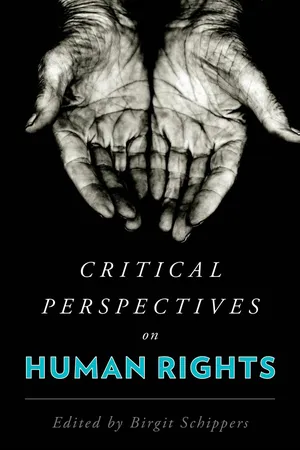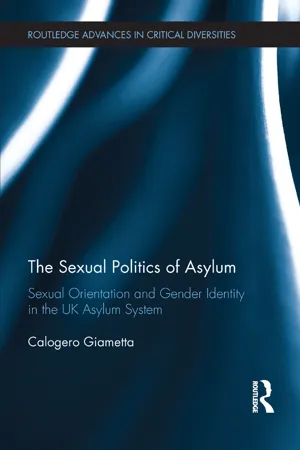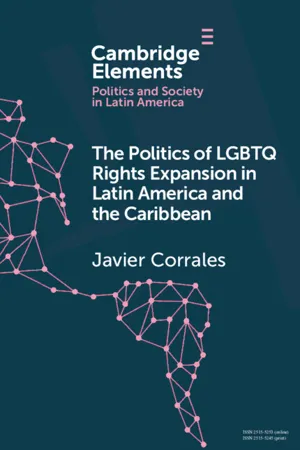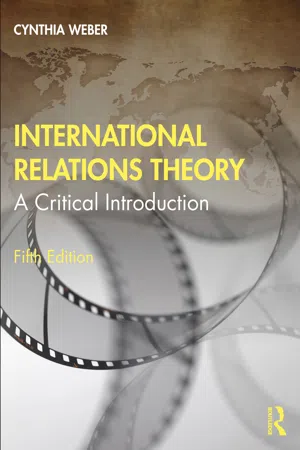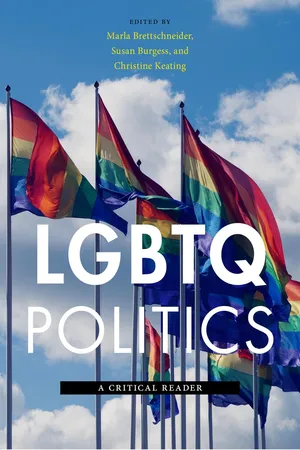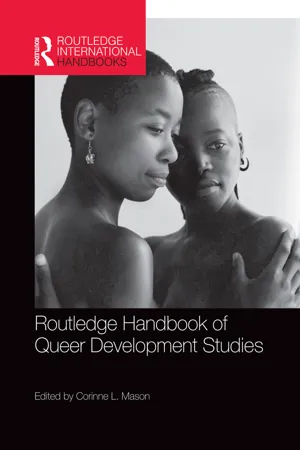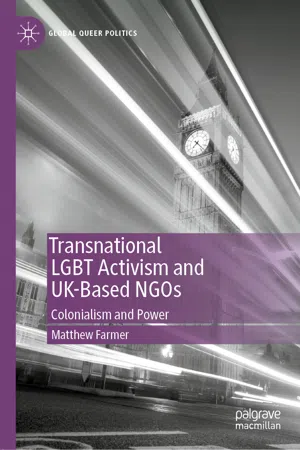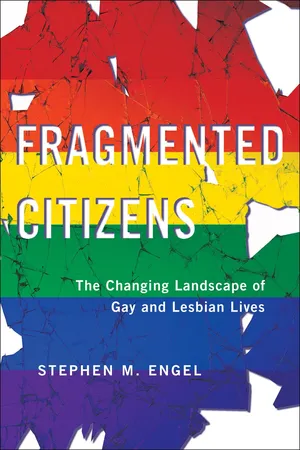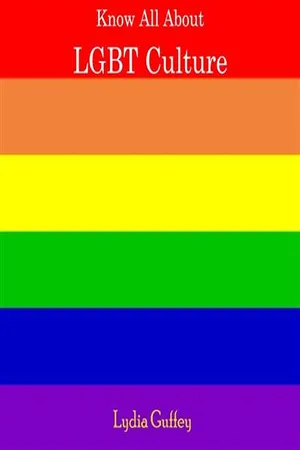Politics & International Relations
LGBTQ Rights
LGBTQ rights refer to the legal and social rights of lesbian, gay, bisexual, transgender, and queer individuals. These rights encompass issues such as marriage equality, anti-discrimination laws, healthcare access, and protection from hate crimes. The struggle for LGBTQ rights has been a significant aspect of social and political movements worldwide, aiming to secure equal treatment and opportunities for all individuals regardless of sexual orientation or gender identity.
Written by Perlego with AI-assistance
Related key terms
1 of 5
9 Key excerpts on "LGBTQ Rights"
- eBook - PDF
- Birgit Schippers(Author)
- 2018(Publication Date)
- Rowman & Littlefield Publishers(Publisher)
In each of these cases there is a substantive issue concerning the failure to treat sexual and gender diverse people according to human rights norms. But in each case as well , the rights issue has been used as a stage on which to play out other forms of contentious politics. Sexuality and gender rights and the associated discourses and institutions have thus become a premier tool at the interna-tional level for complex geopolitical strategizing and positioning (cf. Altman and Symons 2016; Amar 2013). The consequences of this for individuals and groups of people can be devastating. The well-meaning (but often naive) pursuit of freedoms and equality through these newly and selectively available institutions and global relations can in fact have seriously detrimental consequences for vulnerable populations in regions where they are still not recognized as rights-holders and where the associated political spectacle offers political elites some tan-gentially related advantage (Rao 2012). This outcome, to the extent it is noted, is conventionally illustrated at the global level. The view is generally from the Global North, with the vulnerable populations characteristically being situated in the Global South. This routine telling itself elides the ways in which queer populations, particularly queer people of colour in the Global North, fail to be recognized and supported by the new LGBT rights regimes (cf. Haritaworn 2017). This tendency for Global North organizations and institutions to pursue a politics of gay rights which suits their immediate constituencies but is harmful to others, unfortunately conforms to a well-established pattern within the global human rights and humanitarian space (for different examples see Ahmed 2011; Hopgood 2013). We need to have these contexts in mind when we ask what it means to be recognized as an LGBT rights holder in the global human rights practice. - eBook - ePub
- Calogero Giametta(Author)
- 2017(Publication Date)
- Routledge(Publisher)
Chapter 7 , suffice it to say here that by glossing over specificities, the humanitarian discourses emanating from human rights institutional stakeholders perpetuate conditions of subalternity. Those gender and sexual subjectivities that do not find a translation in the humanitarian-informed systems of protection are received antagonistically by being readily cast as inauthentic and fraudulent.Transnational LGBT Activism: “Today London, Tomorrow the World”
Over the past decade the internationalization of LGBT rights as human rights has seen an important acceleration. Let us consider the following developments; the 2006 Declaration of Montreal (International conference on LGBT human rights), the Yogyakarta Principles of the Application of International Human Rights Law in Relation to Sexual Orientation and Gender Identity, and the 2011 United Nations Human Rights Council (UNHRC) Resolution on “Human Rights, Sexual Orientation and Gender Identity.” In this context, the human rights framework has become the official vector for advancing rights claims on the part of LGBT populations globally.Kollman and Waites argue that LGBT movements originating in the West have “increasingly defined themselves as global, seeking to organize across borders and lobby intergovernmental organizations” (2009: 2). The International Gay and Lesbian Human Rights Commission (IGLHRC) and the International Lesbian and Gay Association are among the most prominent international bodies that provide support, documentation, and training to activists in the Global South. Critics have it that the initiatives of these organizations tend to define the terms on which sexual rights demands can be made (Massad 2007; Sabsay 2016). As I have discussed above, these recent political formations seek to frame LGBT political claims within the human rights framework.At the very center of transnational humanitarian action concerning the rights of gender and sexual minorities we find a large network of LGBT activists located both in the Global North and South. In this section I am interested in exploring only some aspects of the complex relationships between Western and non-Western LGBT rights structures and activists. In doing so I base the argument on my ethnography, media analysis of the literature produced by LGBT activist groups, and on debates in public forums, public statements as well as on interviews with civil society actors in London.7 - Javier Corrales(Author)
- 2022(Publication Date)
- Cambridge University Press(Publisher)
See Friedman (2012). 12 Politics and Society in Latin America collaboration of the time focused on AIDS, which meant that perhaps too much emphasis was being placed on the “men-who-have-sex-with-men” community to the chagrin of other concerns and constituencies of the LGBTQ community. In short, this was a period of enormous innovations in interactions between LGBTQ movements and other movements, ministries, political parties, and international organizations, but the results in terms of expanding rights or even changing homophobic public opinion were for the most part modest. 4 The Rights Explosion of the 2000s In the 2003–13 period, things cleared up a bit for LGBTQ politics. Latin America was able to solve many of the macroeconomic problems of the past. The AIDS crisis stopped being an all-consuming issue for the gay community. Poverty declined. Groups calling for new forms of participatory democracy gained power. Politicians began to understand better the notion of sexual citizenship. In addition, LGBTQ organizing experienced a boom in several countries. In Mexico, for instance, pro-LGBTQ groups expanded from approxi- mately ten nationwide in 1990 to nearly forty in Mexico City alone by 2000 (Díez 2015). All these changes created conditions for what could very well be described as the most important transformation of the legal environment for LGBTQ people in the history of the world outside of the North Atlantic. The LGBTQ politics during this period focused on these main topics: (1) stronger and broader antidiscrimination policies and ordinances, including hate crime laws; (2) more proactive policies to educate elected officials, civil servants, school teachers and staff, health providers, the police, and the population at large; (3) changes to civil codes to ensure rights for same-sex families (matrimonio igualitario, familias homoparentales y diversas, derechos patrimoniales); 13 and (4) gender identity recognition for trans and intersex people.- eBook - ePub
International Relations Theory
A Critical Introduction
- Cynthia Weber(Author)
- 2021(Publication Date)
- Routledge(Publisher)
Chapter 11Global LGBT studies
Are gay rights human rights, and are human rights gay rights?
- Queer IR Theories
- What does the myth say?
- Love is Strange
- Love is Regulated
- Suggestions for further thinking
If the slogan of Occupy Wall Street that rang around the world was “We are the 99 percent,” then the slogan of many contemporary LGBT (lesbian, gay, bisexual, and trans) global movements is “Gay rights are human rights, and human rights are gay rights.” These were the words spoken by then US Secretary of State Hillary Clinton at the United Nations on Human Rights Day in 2011 (Clinton, 2011). For some, Clinton’s declaration was embraced as the culmination of personal, social, and national battles for recognition, rights, and respect that had been waged by gender variant, gender nonconforming, and gender expanding people for decades. Even though these battles took place in a number of states in relation to specific social, cultural, and political dynamics and with coalitions of people working across international borders, they were rarely thought of as international issues, least of all by global elites. Clinton’s declaration changed that.Among the things that makes Clinton’s case for gay rights as human rights so compelling is how she justifies it in relation to the 1947 United Nations Declaration of Human Rights (UDHR). While this Declaration makes no mention of gender variant, gender nonconforming, and gender expanding people, Clinton argues that this is an insufficient fact to make the claim that lesbian, gay, bisexual, and transgendered people across the globe—who Clinton refers to as LGBTs—do not and should not have human rights. This is because throughout history many groups now recognized as legitimate minorities with the right to have rights also received no mention in the UDHR. These legitimate minorities include indigenous people, children, and people with disabilities (2011: 2). Clinton continues, “Yet in the past 60 years, we have come to recognize that members of these groups are entitled to the full measure of dignity and rights, because, like all people, they share a common humanity” (2011: 2). - eBook - ePub
LGBTQ Politics
A Critical Reader
- Marla Brettschneider, Susan Burgess, Christine Keating(Authors)
- 2017(Publication Date)
- NYU Press(Publisher)
This leads to another important direction for future research, which is already underway in social science, namely, the effects of LGBTQ-rights recognition or the effects of changes in state policy for LGBTQ and other communities. Do homonormative policies disadvantage people of color in the same country or community? What are the economic and social implications of recognizing same-sex marriage for those who are economically and socially marginal within LGBTQ and other communities? How are LGBTQ Rights used in the service of foreign policy goals or state-sanctioned racialization projects? In particular, building on past work by socio-legal scholars such as Carl Stychin (1998), public policy scholars could consider the relationship between nationalism, especially nationalist claims made by state elites, and the recognition of LGBTQ Rights. In addition, exploring how homonormative narratives of state recognition reinforce nationalism in a particular site is also an important potential trajectory of research. Interview material on American and Canadian same-sex couples in relation to the construction of legality in same-sex relationships often emphasizes the extent to which couples seek marriage or marriage-like relationships in order to be the same as everyone else or to fit in with society (Nicol and Smith 2008, 677). This would seem to emphasize the homonormative dynamic of same-sex marriage. On the other hand, some people of color argue that state regulation of same-sex marriage is analogous to laws that prohibited interracial marriage and note the use of state law that dated back to slavery days to prevent the legal recognition of same-sex marriages (see Nicol and Smith 2008, 676). The role of the social scientist should be to present these diverse views and explore connections between and among diverse LGBTQ political and social actors as well as political and social actors outside the LGBTQ community.ConclusionThe concepts of homonationalism and pinkwashing have become central to the discussion of queer rights in cultural studies and allied disciplines. At the same time, political scientists have increasingly considered the trajectory of LGBTQ-rights recognition in comparative perspective, attempting to explain why some countries have adopted LGBTQ-rights recognition while others have not. This burgeoning comparative literature could benefit from engagement with Puar’s ideas and the debates surrounding them. Such an engagement, especially by scholars based in the United States, would encourage the exploration of the relationship between American hegemony and the increasingly global project of LGBTQ-rights recognition. At the same time, comparative scholars would benefit from considering the links among and between LGBTQ-rights recognition, racism, and national claims. These complexities go far beyond the intersectional approaches that are sometimes cited in the socio-legal literature. Indeed, the idea that recognizing the rights of LGBTQ people as citizens in the United States, the EU, and other Western countries or that recognizing global principles of LGBTQ Rights such as those encapsulated in the Yogyakarta Principles - eBook - ePub
- Corinne L. Mason(Author)
- 2018(Publication Date)
- Routledge(Publisher)
st World Outgames Montreal 2006.International Gay and Lesbian Human Rights Commission. 2008. “ 66 states condemn violations based on sexual orientation and gender identity ,” Retrieved from http://www.iglhrc.org/site/iglhrc/section.php?id=5&detail=911 on 20 December 2008.Jackson, P. 2007. “ An explosion of Thai identities: global queering and re-imagining queer theory.” In Culture, society and sexuality: a reader , edited by Parker, R. and Aggleton, P. , pp. 341–357, London: Routledge.Kaldor, M. 2003. Global civil society: an answer to war . Cambridge: Polity Press.Keane, J. 2003. Global civil society? Cambridge: Cambridge University Press.Kollman, K. and Waites, M. 2009. “ The global politics of lesbian, gay, bisexual and transgender human rights: an introduction.” Contemporary Politics 15, no. 1: 1–17.Lockwood, B. 2006. Women’s rights: a human rights quarterly reader . Baltimore, MD: The Johns Hopkins University Press.Louw, R. 1998. “ Gay and lesbian sexualities in South Africa: from outlawed to constitutionally protected.” In Legal queeries: lesbian, gay and transgendered legal studies , edited by Moran, L.J., Monk, D. and Beresford, S. , pp. 139–154, London: Cassell.Millett, K. 1971. Sexual politics . London: Rupert Hart-Davis Ltd.Moran, D. 2000. Introduction to phenomenology . Abingdon: Routledge.Moran, L.J. 1996. The homosexual(ity) of law . London: Routledge.Morgan, W. 2000. “ Queering international human rights law.” In Sexuality in the legal arena , edited by Stychin, C. and Herman, D. , pp. 208–225, London: Athlone Press.Narrain, A. and Bhan, G. 2005. Because I have a voice: queer politics in India . New Delhi: Yoda Press.O’Flaherty, M. and Fisher, J. 2008. “ Sexual orientation, gender identity and international human rights law: contextualising the Yogyakarta Principles.” Human Rights Law Review 8, no. 2: 207–248.Palmberg, M. 1999. “ Emerging visibility of gays and lesbians in southern Africa: contrasting contexts.” In The global emergence of gay and lesbian politics: national imprints of a worldwide movement - eBook - ePub
Transnational LGBT Activism and UK-Based NGOs
Colonialism and Power
- Matthew Farmer(Author)
- 2020(Publication Date)
- Palgrave Macmillan(Publisher)
coloniality , the Western way of enacting a politics of LGBT acceptance as the correct, aspirational one to which other states must progress towards.In Europe , sexual politics and LGBT rights have featured prominently in debates about multiculturalism and Islamophobia in European society, in which LGBT rights are often deployed in homonationalist terms to mark Muslims and ‘others’ as different and unable to embody European ‘values’ (Ayoub and Paternotte 2014 ; Butler 2008 ; Fassin 2010 ; Haritaworn et al. 2008 ; Mepschen et al. 2010 ). Sexual politics and LGBT rights are selectively deployed by political actors to mark particular people as non-citizens for their failure to accept or embody the values of the nation, whilst simultaneously denying full rights and equality to queer citizens that would threaten the heteronormativity of the nation. Drawing on France as an example, both Butler (2008 ) and Fassin (2010 ) have noted that the means by which the nation is defended against those who do not embody ‘our’ cultural norms only selectively draw upon the sexual politics they claim to defend, whilst restricting those elements of sexual politics that would threaten the nation from within. Immigration policies in both Germany and the Netherlands have been noted to question prospective immigrants on their attitudes to LGBT people and relationships as a means of ensuring that they adhere to the supposed accepted sexual values of the nation (Butler 2008 ; Fassin 2010 , pp. 515–518). Muslim immigrants in particular are assumed to pose a threat to the values of the nation, or otherwise to LGBT populations (Mepschen et al. 2010 , p. 968). Such arguments feature as part of broader far-right, anti-immigration politics, which deploy homonationalist fears of particular immigrants (mainly Muslims), whilst simultaneously engaging in a homophobic politics that seeks to discriminate against and restrict queer lives. This is evident in the 2016 US election campaign of Donald Trump, where he and Milo Yiannopoulos, a (formerly) popular figure in the ‘alt-right’ despite being gay himself, suggested that mass Muslim immigration to the United States would result in the suppression and murder of gay people, whilst Trump’s administration has since consistently reversed LGBT protections and introduced discriminatory policies whilst in power (Berg and Syed 2019 ; Duffy 2016a , b ; Levin 2019 ; see also, Long 2015a ; Rao 2010 - eBook - ePub
Fragmented Citizens
The Changing Landscape of Gay and Lesbian Lives
- Stephen M. Engel(Author)
- 2016(Publication Date)
- NYU Press(Publisher)
1From Individual Rights to Institutional Recognitions
Toward a Developmental Account of Gay and Lesbian Politics
There is no notion more central in politics than citizenship, and none more variable in history, or contested in theory.—Judith N. Shklar, American Citizenship: The Quest for Inclusion, 19911The institutions of a polity are not created or recreated all at once, in accordance with a single ordering principle; they are created instead at different times, in the light of different experiences, and often for quite contrary purposes. . . . [P]olitics in the United States, like politics elsewhere, consists, in large part at least, in acting out the consequences.—Karen Orren and Stephen Skowronek, The Search for American Political Development, 20042LGBT rights are often described and pursued in ways parallel to historical and ongoing struggles for African American civil rights, labor rights, and women’s rights.3 Such comparisons are drawn in our most prominent exemplars of civic rhetoric. For example, in his 2012 inaugural address, President Barack Obama stamped the LGBT movement with the legitimating imprimatur of the civil rights and women’s rights movements that preceded it:We, the people, declare today that the most evident of truths—that all of us are created equal—is the star that guides us still; just as it guided our forebears through Seneca Falls, and Selma, and Stonewall; just as it guided all those men and women, sung and unsung, who left footprints along this great Mall, to hear a preacher say that we cannot walk alone; to hear a King proclaim that our individual freedom is inextricably bound to the freedom of every soul on Earth.4By folding the LGBT rights movements into the canon of a national narrative of progress toward yet-unrealized constitutional ideals, Obama embraced a dynamic pluralist vision of democracy. And, his reference to Stonewall—a Greenwich Village gay bar where a multiday riot sparked the modern gay rights movement—would hardly go unnoticed.5 Media commentators lighted upon it as groundbreaking, a moment when the LGBT rights movement was acknowledged as legitimate, included within the pantheon of the rights struggles at the heart of civic identity, and vital to the realization of liberty and equality.6 - No longer available |Learn more
- (Author)
- 2014(Publication Date)
- The English Press(Publisher)
________________________ WORLD TECHNOLOGIES ________________________ Chapter-4 LGBT Social Movements Gay rights demonstration in New York City, 1976 Lesbian, gay, bisexual and transgender social movements share inter-related goals of social acceptance of sexual and gender minorities. Lesbian, gay, bisexual and transgender (LGBT) people and their allies have a long history of campaigning for what is generally called LGBT rights , also called gay rights and gay and lesbian rights . Various communities have worked not only together, but also independent of each other in various configurations including gay liberation, lesbian feminism, the queer movement and transgender activism. There is no one organization representing all LGBT people and interests, although arguably two organizations come close; InterPride by coordinating and networking gay pride events worldwide, and International Gay and Lesbian Human Rights Commission (IGLHRC) which addresses human rights violations against LGBT and HIV people and works with the United Nations are seen as broadly inclusive all LGBT communities and interests. A commonly stated goal is social equality for LGBT people; some have also focused on building LGBT communities, or worked towards liberation for the broader society from sexual oppression. LGBT movements organized today are made up of a wide range of political activism and cultural activity, such as lobbying and street marches; social groups, support groups and community events; magazines, films and literature; academic research and writing; and even business activity. ________________________ WORLD TECHNOLOGIES ________________________ Workers of the Taiwan Tongzhi Hotline Association participating in 2005 Taiwan Pride parade in Taipei.
Index pages curate the most relevant extracts from our library of academic textbooks. They’ve been created using an in-house natural language model (NLM), each adding context and meaning to key research topics.
